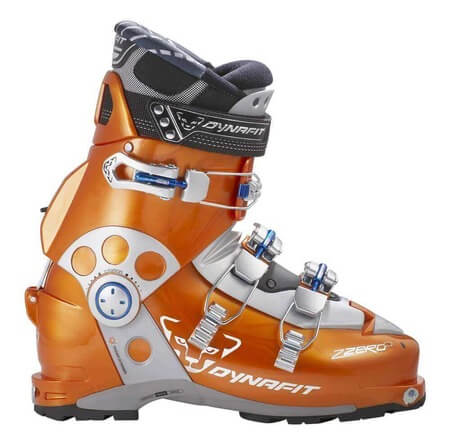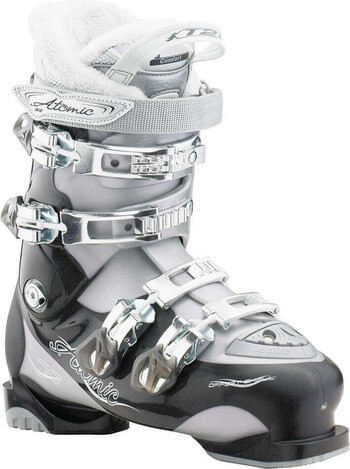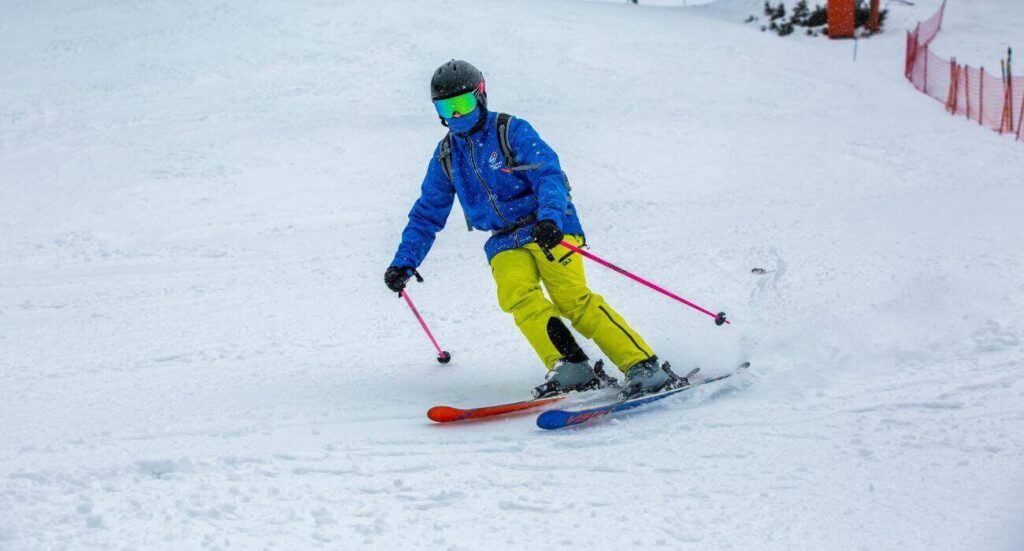As an Amazon Associate, I earn from qualifying purchases
Ski boots typically weigh between 2.5 and 5 pounds (1.13 – 2.27 kg). Ski boot weight is an important consideration for skiers, as lighter boots can offer increased agility and maneuverability on the slopes.
However, it is also important to find a balance between weight and support, as heavier boots often provide more stability and control. Additionally, the weight of ski boots can vary depending on the type and intended use. Downhill ski boots tend to be heavier, while backcountry and touring boots are designed to be lighter for easier hiking and climbing.
Overall, finding the right weight ski boot is a personal preference that should be based on individual skiing style and ability.
Overview Of Ski Boot Weight

Ski boot weight can vary depending on the type and size. On average, alpine ski boots weigh between 4-8 pounds, while backcountry ski boots can be lighter, ranging from 3-6 pounds. The weight of ski boots is an important factor to consider for comfort and performance on the slopes.
When it comes to skiing, every detail matters. From the type of skis to the gear you wear, every component contributes to your overall performance on the slopes. One often overlooked factor is the weight of ski boots. Ski boot weight plays a significant role in your skiing experience, affecting your comfort, control, and maneuverability on the mountain.
Why Does Ski Boot Weight Matter?
The weight of your ski boots is crucial for several reasons, including comfort and performance on the slopes. How Much Do Ski Boots Weigh? Firstly, it directly influences your comfort level. Lighter boots are generally more comfortable to wear for extended periods, reducing fatigue and allowing you to focus on the joy of skiing. On the other hand, heavier boots can feel cumbersome and may lead to discomfort, hindering your performance on the slopes.
Secondly, ski boot weight affects your control and maneuverability. Lighter boots are easier to move, allowing for quicker and more precise turns. They also enable better balance and responsiveness, enhancing your ability to navigate challenging terrains or execute technical maneuvers. In contrast, heavier boots can hamper your agility, making it more difficult to perform quick and fluid movements.
Lastly, ski boot weight impacts your overall performance on the mountain. Lighter boots provide a greater sense of connection with the skis, enabling better power transmission and enhancing your skiing technique. They also contribute to faster ski-to-snow response, allowing you to adapt to changing conditions and terrain more efficiently. Heavier boots, on the other hand, may hinder your ability to maximize your potential and can limit your progression as a skier.
How To Determine Ski Boot Weight
Determining the weight of ski boots is relatively straightforward. Manufacturers usually provide this information for their products, allowing you to make an informed decision before purchasing. You can find ski boot weight specifications on the manufacturer’s website, in product descriptions, or by consulting with knowledgeable ski gear retailers. If you’re wondering, How much do ski boots weigh? – fret not, as this crucial detail is readily available from these sources.
It’s important to note that ski boot weight can vary depending on the model, size, and specific features. Higher-end performance boots tend to be lighter due to the use of advanced materials and construction techniques. However, these boots may also come at a higher price point. It’s essential to strike a balance between weight, performance, and budget to find the right ski boots for your needs.
The Impact Of Ski Boot Weight On Performance
The impact of ski boot weight on performance cannot be overstated. Lighter boots not only enhance your comfort and maneuverability but also enable you to push your skiing abilities to new heights. They allow for better control, faster response, and improved power transmission, ultimately leading to a more enjoyable and fulfilling skiing experience. If you’re wondering, How much do ski boots weigh?—it’s a valid question. After all, the weight of your ski boots directly affects your overall performance on the slopes.
However, it’s crucial to find the right balance for your skiing style and ability level. While lighter boots offer many advantages, they may not be suitable for more aggressive or expert skiers who require additional support and stability. In such cases, slightly heavier boots with added features might be more appropriate.
Ultimately, finding the ideal ski boot weight is a personal choice that depends on your specific needs and preferences. It’s worth considering factors such as your skiing ability, style, terrain preferences, and physical fitness when selecting the right ski boots to optimize your performance on the mountain.
The Lightest Downhill Ski Boots

Ski boots are an essential piece of equipment for any skier. They provide support, control, and stability while zooming down the slopes. When it comes to choosing the right ski boots, weight is an important factor to consider. Heavier boots can cause unnecessary strain and fatigue on your legs, making it harder to enjoy your time on the mountain. That’s why many skiers are now opting for lighter downhill ski boots. In this article, we will explore some of the lightest downhill ski boots available on the market today.
Alpina Tourer Free Ski Boot
The Alpina Tourer Free Ski Boot is a popular choice among skiers who value lightweight performance. Weighing in at just under 4 pounds, these boots offer a perfect balance of comfort and agility on the slopes. The minimalist design reduces unnecessary bulk, allowing skiers to move freely and effortlessly. Made with high-quality materials, the Alpina Tourer Free Ski Boot provides excellent durability without compromising on weight.
Full Tilt Drop Kick Ski Boots
If you’re looking for a lightweight ski boot with a progressive flex and customizable fit, then the Full Tilt Drop Kick Ski Boots might be the perfect choice for you. These boots weigh around 3.9 pounds, making them one of the lightest options on the market. Their unique three-piece construction allows for natural flex and efficient energy transfer, providing skiers with unmatched control and precision.
Evo Ski Boots
The Evo Ski Boots are another excellent option for skiers seeking lightweight performance. Weighing in at approximately 3.7 pounds, these boots prioritize agility and comfort without compromising on quality. The heat-moldable liners ensure a customized fit, while the sturdy shell provides the necessary support and responsiveness. Whether you’re carving down groomed runs or exploring off-piste terrain, the Evo Ski Boots are designed to enhance your skiing experience.
When it comes to choosing the right ski boots, weight plays a significant role in overall comfort and performance. The lightest downhill ski boots, such as the Alpina Tourer Free Ski Boot, Full Tilt Drop Kick Ski Boots, and Evo Ski Boots, allow skiers to move more freely and effortlessly on the slopes. By opting for these lightweight options, you can reduce strain and fatigue, maximizing your enjoyment and performance on the mountain.
Choosing The Best Lightweight Ski Boots

When it comes to skiing, having the right equipment can make all the difference in your performance and comfort on the slopes. One piece of gear that often gets overlooked but plays a critical role is ski boots. The weight of ski boots can greatly impact your skiing experience, affecting your agility, control, and overall enjoyment. If you’re looking for a pair of ski boots that provide excellent performance while being lightweight, here are some factors to consider, popular lightweight ski boot brands, and tips for finding the perfect fit.
Factors To Consider
- Material: Look for ski boots made from lightweight materials such as carbon or synthetic materials like polyurethane, which can significantly reduce the overall weight.
- Flex Rating: Opt for ski boots with a lower flex rating, as these tend to be lighter in weight. However, keep in mind that a lower flex may sacrifice some stiffness and responsiveness.
- Customization Options: Some ski boots have adjustable features like heat-moldable liners or flex adjustments, allowing you to fine-tune the fit and performance to your liking.
- Liner Technology: Consider ski boots with innovative liner technologies, like foam injections or 3D molding, as they can provide a precise and secure fit without adding unnecessary bulk.
- Boot Sole: Pay attention to the sole material of the ski boots. A lightweight sole, such as those made from lightweight rubber or Vibram, can contribute to a lighter overall weight.
Popular Lightweight Ski Boot Brands
| Brand | Weight Range (per boot) | Key Features |
|---|---|---|
| Alpina | 2.7-3.3 lbs | Carbon cuff, Thinsulate insulation |
| Full Tilt | 4.2-4.8 lbs | Intuition liners, progressive flex |
| Evo | 4.4-5.2 lbs | Adjustable forward lean, heat-moldable shell |
| Crispi | 4.7-6.0 lbs | Pebax shell, walk mode |
| Tecnica | 3.6-4.2 lbs | Lightweight construction, adjustable flex |
Tips For Finding The Perfect Lightweight Ski Boots
- Get Professionally Fitted: Visit a reputable ski shop and get professionally fitted for ski boots. An expert can help you find the right size, flex, and features that match your skiing style and ability.
- Consider Your Skill Level: Beginner and intermediate skiers may prioritize comfort and ease of use, while advanced skiers might prioritize performance and responsiveness.
- Try Before You Buy: Don’t be afraid to try on multiple brands and models to find the perfect fit. Walk around, flex your ankles, and make sure the boots feel comfortable and secure.
- Read Reviews and Seek Recommendations: Look for online reviews or ask fellow skiers for their recommendations on lightweight ski boots. Hearing from others who have tried and tested the boots can provide valuable insights.
- Consider the Conditions: Think about the type of terrain and conditions you’ll be skiing in. Different boots are designed for different skiing disciplines, so consider the features that will best suit your needs.
- Budget: Determine your budget and find a pair of boots that provide the best value for your money. Remember that quality and performance often come at a higher price point.
Frequently Asked Questions On How Much Do Ski Boots Weigh
How Much Do Boots Weigh?
The weight of boots varies depending on the type and size, but on average, boots weigh between 1-3 pounds or 0. 45-1. 36 kilograms.
How Much Do Mens Skis Weigh?
Men’s skis typically weigh between 6 and 8 pounds or 2. 7 to 3. 6 kilograms.
Can A Woman Wear Men’s Ski Boots?
Women can wear men’s ski boots, but it may not be the best option. Women’s legs and feet are built differently, with lower and wider calves, narrower heels, and wider forefeet. Men’s ski boots can be tight on women’s calves, restrict blood flow, and limit carving power.
What Size Ski Boot Is A Men’s 12?
A men’s size 12 ski boot is typically around 320 to 340 millimeters in length.
Conclusion
Determining the weight of ski boots is crucial for every skier. From enhancing performance to avoiding discomfort, the weight of ski boots plays a significant role. Lighter ski boots can provide better mobility and control on the slopes. It is important to consider the weight of ski boots when making a purchase, as it can greatly impact your skiing experience.
With the right weight and fit, you can fully enjoy your time on the mountains.
Read More
1. What Size Ski Poles Do I Need? Find Your Perfect Fit
2. Top 5 Best Hydration Packs For Skiing
As an Amazon Associate, I earn from qualifying purchases

